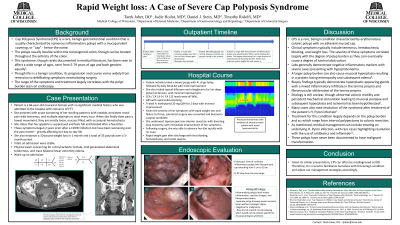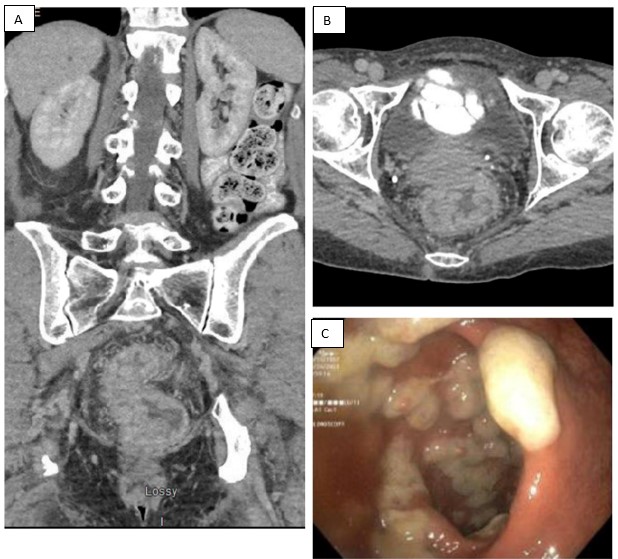Monday Poster Session
Category: Colon
P2006 - Rapid Weight Loss: A Case of Severe Cap Polyposis Syndrome
Monday, October 28, 2024
10:30 AM - 4:00 PM ET
Location: Exhibit Hall E

Has Audio
.jpg)
Tarek Jaber, DO
Medical College of Wisconsin
West Allis, WI
Presenting Author(s)
Tarek Jaber, DO1, Judie Hoilat, MD2, Daniel J.. Stein, MD2, Timothy Ridolfi, MD2
1Medical College of Wisconsin, West Allis, WI; 2Medical College of Wisconsin, Milwaukee, WI
Introduction:
Cap polyposis syndrome (CPS) is a rare, benign condition with a hallmark appearance characterized by inflammatory colonic polyps covered by a white exudate or “cap,” from which the condition derives its name. We present a case of CPS in a 65-year-old healthy female presenting with two-year history of bloody, mucoid diarrhea and rectal spasms. This case highlights the debilitating impact of CPS with a high polyp burden on an individual's well-being, despite its benign nature. Consequently, a surgical approach was necessary to alleviate her symptoms.
Case Description/Methods:
A 65-year-old female presents to our GI clinic with concerns of pelvic pain triggered by bowel movements, bloody, mucoid diarrhea, and 35-pounds weight loss over two years. Physical exam with mild generalized abdominal tenderness. Labs revealed mild hypoalbuminemia with normal inflammatory markers and stool studies. MR defecography and anorectal manometry revealed rectal dyssynergia. She underwent multiple colonoscopies revealing many polyps ranging in size from 0.5 to 2 cm. They exhibited an exudative surface and spanned a few cm proximal to the anal canal to 20 cm into the colon. Four polyps were removed with pathological analysis revealing inflammatory type polyps with one showing low-grade dysplasia. Due to the increase in polyp burden and persistent symptoms, she underwent laparoscopic low anterior resection with colorectal anastomosis and diverting loop ileostomy, resulting in significant relief. Colonoscopy six months later revealed diversion colitis and mild erosions throughout the colon. The descending colon demonstrated mucosal erythema, friability with many superficial ulcerations, and one tubular adenomatous polyp. Pathology results of the left colon revealed colitis with crypt architect distortion, superficial erosions, and inflamed granulation tissue concerning for ischemia – a proposed mechanism of CPS pathogenesis.
Discussion:
CPS is a rare and benign condition. Patients commonly present with bloody, mucoid diarrhea, abdominal pain, and weight loss. It should be suspected in patients with erythematous colonic polyps with an adherent mucoid cap and is established by biopsy with findings of hyperplastic appearing glands with mixed inflammatory infiltrate and fibromuscular obliteration within the lamina propria. Given its similar presentation, CPS can often be misdiagnosed as IBD. Therefore, it is crucial to familiarize ourselves with this benign condition and adjust our management strategies accordingly.

Disclosures:
Tarek Jaber, DO1, Judie Hoilat, MD2, Daniel J.. Stein, MD2, Timothy Ridolfi, MD2. P2006 - Rapid Weight Loss: A Case of Severe Cap Polyposis Syndrome, ACG 2024 Annual Scientific Meeting Abstracts. Philadelphia, PA: American College of Gastroenterology.
1Medical College of Wisconsin, West Allis, WI; 2Medical College of Wisconsin, Milwaukee, WI
Introduction:
Cap polyposis syndrome (CPS) is a rare, benign condition with a hallmark appearance characterized by inflammatory colonic polyps covered by a white exudate or “cap,” from which the condition derives its name. We present a case of CPS in a 65-year-old healthy female presenting with two-year history of bloody, mucoid diarrhea and rectal spasms. This case highlights the debilitating impact of CPS with a high polyp burden on an individual's well-being, despite its benign nature. Consequently, a surgical approach was necessary to alleviate her symptoms.
Case Description/Methods:
A 65-year-old female presents to our GI clinic with concerns of pelvic pain triggered by bowel movements, bloody, mucoid diarrhea, and 35-pounds weight loss over two years. Physical exam with mild generalized abdominal tenderness. Labs revealed mild hypoalbuminemia with normal inflammatory markers and stool studies. MR defecography and anorectal manometry revealed rectal dyssynergia. She underwent multiple colonoscopies revealing many polyps ranging in size from 0.5 to 2 cm. They exhibited an exudative surface and spanned a few cm proximal to the anal canal to 20 cm into the colon. Four polyps were removed with pathological analysis revealing inflammatory type polyps with one showing low-grade dysplasia. Due to the increase in polyp burden and persistent symptoms, she underwent laparoscopic low anterior resection with colorectal anastomosis and diverting loop ileostomy, resulting in significant relief. Colonoscopy six months later revealed diversion colitis and mild erosions throughout the colon. The descending colon demonstrated mucosal erythema, friability with many superficial ulcerations, and one tubular adenomatous polyp. Pathology results of the left colon revealed colitis with crypt architect distortion, superficial erosions, and inflamed granulation tissue concerning for ischemia – a proposed mechanism of CPS pathogenesis.
Discussion:
CPS is a rare and benign condition. Patients commonly present with bloody, mucoid diarrhea, abdominal pain, and weight loss. It should be suspected in patients with erythematous colonic polyps with an adherent mucoid cap and is established by biopsy with findings of hyperplastic appearing glands with mixed inflammatory infiltrate and fibromuscular obliteration within the lamina propria. Given its similar presentation, CPS can often be misdiagnosed as IBD. Therefore, it is crucial to familiarize ourselves with this benign condition and adjust our management strategies accordingly.

Figure: CT abdomen and pelvis with contrast demonstrated in coronal (A) and axial (B) with evidence of polypoid lesions within the rectosigmoid colon.
Numerous nodules with pseudomembrane appearance on top within the rectosigmoid colon seen during endoscopic evaluation (C).
Numerous nodules with pseudomembrane appearance on top within the rectosigmoid colon seen during endoscopic evaluation (C).
Disclosures:
Tarek Jaber indicated no relevant financial relationships.
Judie Hoilat indicated no relevant financial relationships.
Daniel Stein: Abbvie – Consultant, Speakers Bureau. BMS – Consultant, Speakers Bureau. Janssen – Speakers Bureau. Lilly – Speakers Bureau. Pfizer – Speakers Bureau. Takeda – Speakers Bureau.
Timothy Ridolfi indicated no relevant financial relationships.
Tarek Jaber, DO1, Judie Hoilat, MD2, Daniel J.. Stein, MD2, Timothy Ridolfi, MD2. P2006 - Rapid Weight Loss: A Case of Severe Cap Polyposis Syndrome, ACG 2024 Annual Scientific Meeting Abstracts. Philadelphia, PA: American College of Gastroenterology.

